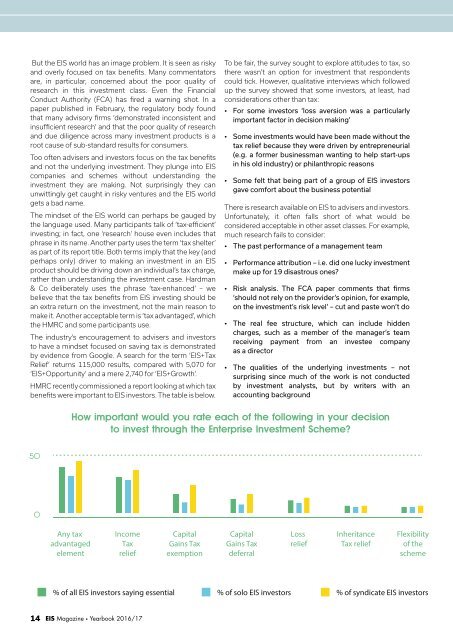2fnoNyY
2fnoNyY
2fnoNyY
You also want an ePaper? Increase the reach of your titles
YUMPU automatically turns print PDFs into web optimized ePapers that Google loves.
But the EIS world has an image problem. It is seen as risky<br />
and overly focused on tax benefits. Many commentators<br />
are, in particular, concerned about the poor quality of<br />
research in this investment class. Even the Financial<br />
Conduct Authority (FCA) has fired a warning shot. In a<br />
paper published in February, the regulatory body found<br />
that many advisory firms ‘demonstrated inconsistent and<br />
insufficient research’ and that the poor quality of research<br />
and due diligence across many investment products is a<br />
root cause of sub-standard results for consumers.<br />
Too often advisers and investors focus on the tax benefits<br />
and not the underlying investment. They plunge into EIS<br />
companies and schemes without understanding the<br />
investment they are making. Not surprisingly they can<br />
unwittingly get caught in risky ventures and the EIS world<br />
gets a bad name.<br />
The mindset of the EIS world can perhaps be gauged by<br />
the language used. Many participants talk of ‘tax-efficient’<br />
investing; in fact, one ‘research’ house even includes that<br />
phrase in its name. Another party uses the term ‘tax shelter’<br />
as part of its report title. Both terms imply that the key (and<br />
perhaps only) driver to making an investment in an EIS<br />
product should be driving down an individual’s tax charge,<br />
rather than understanding the investment case. Hardman<br />
& Co deliberately uses the phrase ‘tax-enhanced’ – we<br />
believe that the tax benefits from EIS investing should be<br />
an extra return on the investment, not the main reason to<br />
make it. Another acceptable term is ‘tax advantaged’, which<br />
the HMRC and some participants use.<br />
The industry’s encouragement to advisers and investors<br />
to have a mindset focused on saving tax is demonstrated<br />
by evidence from Google. A search for the term ‘EIS+Tax<br />
Relief’ returns 115,000 results, compared with 5,070 for<br />
‘EIS+Opportunity’ and a mere 2,740 for ‘EIS+Growth’.<br />
HMRC recently commissioned a report looking at which tax<br />
benefits were important to EIS investors. The table is below.<br />
To be fair, the survey sought to explore attitudes to tax, so<br />
there wasn’t an option for investment that respondents<br />
could tick. However, qualitative interviews which followed<br />
up the survey showed that some investors, at least, had<br />
considerations other than tax:<br />
• For some investors ‘loss aversion was a particularly<br />
important factor in decision making’<br />
• Some investments would have been made without the<br />
tax relief because they were driven by entrepreneurial<br />
(e.g. a former businessman wanting to help start-ups<br />
in his old industry) or philanthropic reasons<br />
• Some felt that being part of a group of EIS investors<br />
gave comfort about the business potential<br />
There is research available on EIS to advisers and investors.<br />
Unfortunately, it often falls short of what would be<br />
considered acceptable in other asset classes. For example,<br />
much research fails to consider:<br />
• The past performance of a management team<br />
• Performance attribution – i.e. did one lucky investment<br />
make up for 19 disastrous ones?<br />
• Risk analysis. The FCA paper comments that firms<br />
‘should not rely on the provider’s opinion, for example,<br />
on the investment’s risk level’ – cut and paste won’t do<br />
• The real fee structure, which can include hidden<br />
charges, such as a member of the manager’s team<br />
receiving payment from an investee company<br />
as a director<br />
• The qualities of the underlying investments – not<br />
surprising since much of the work is not conducted<br />
by investment analysts, but by writers with an<br />
accounting background<br />
How important would you rate each of the following in your decision<br />
to invest through the Enterprise Investment Scheme?<br />
50<br />
0<br />
Any tax<br />
advantaged<br />
element<br />
Income<br />
Tax<br />
relief<br />
Capital<br />
Gains Tax<br />
exemption<br />
Capital<br />
Gains Tax<br />
deferral<br />
Loss<br />
relief<br />
Inheritance<br />
Tax relief<br />
Flexibility<br />
of the<br />
scheme<br />
% of all EIS investors saying essential % of solo EIS investors % of syndicate EIS investors<br />
14 EIS Magazine · Yearbook 2016/17


